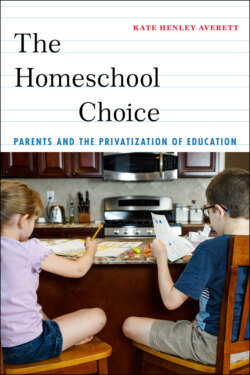Читать книгу The Homeschool Choice - Kate Henley Averett - Страница 33
На сайте Литреса книга снята с продажи.
Concerns about Peer Environment
ОглавлениеParents who expressed this second critique also noted that children’s interactions with their peers could be a source of worry about their children’s development of a gendered or sexual sense of self. Several parents I interviewed talked about how the peer culture of schools encourages conformity to certain gender and sexual norms. This peer culture was described by these parents as being a hierarchical social system in which a person’s ability to have and sustain social relationships is largely determined by their place in this hierarchy, and in which nonconformity can mean being relegated to the bottom of the social ladder.15 Parents with this concern were sympathetic to children’s difficulties in resisting peer pressure, and acknowledged the potentially devastating effects of being socially ostracized in school, but worried that this culture caused children to act in ways that would compromise their “true selves.” Mindy, a low-income, white, single mother of one daughter, Emma, stated that “there is a lot of pressure in schools, to do drugs, to drink, and while I’m sure that she’s going to get some of that anyway, and probably will experiment with all of those things, I think it’s different than the kind of pressure you feel to conform in school.” It was not the behaviors themselves that concerned Mindy; she seemed to expect that her daughter, currently six years old, would eventually “experiment” with drinking, drugs, and—as she brought up later in the interview—sexual activity. What Mindy worried about was that Emma would do these things not out of genuine curiosity but because of feeling pressure to do them. For Mindy, these behaviors are not essentially “bad,” but they are made “bad” when they happen in a way that is not guided by her daughter’s own desires.
This concern about the pressure to conform appeared frequently when these parents talked about dating. This group of parents did not have qualms about their children dating—and many wanted it to be very clear that they were not discouraging it—but rather, their concerns were rooted in what might be motivating their children to do so. They were critical of what they saw as children and teens dating because of pressure, rather than desire. Aaron, a white, low-income, married father of three who identified strongly as a libertarian, had recently left his work-at-home job that allowed him to share homeschooling labor with his wife (his older children’s step-mother and youngest child’s mother) to take a job teaching music at a public middle school. Aaron’s oldest daughter, Becca, was a year younger than his current students, and while he said she was “as boy crazy” as his students were, he saw differences in how they date. Becca had a particular boy whom she liked, and they saw each other a few times a week and hung out casually, whereas his students were engaged in what he saw as all-consuming—and sexually active—relationships. He said, “It’s all about status, and that part does not happen in the homeschool groups. Because they—I mean, they make friendships, but because they’re not around each other all the time, they don’t have to have, like, social justifications for this hierarchy of who’s the coolest.” He further explained that he thought part of the appeal of the school relationships is their forbidden quality: students at his school were not even allowed to hold hands in the hallway, and he thought the children sometimes engaged in physical relationships so as to rebel against these rules, whereas “if Becca was holding hands with this boy that likes her, whatever.” Aaron was not concerned with Becca and her friend being physical with each other because they would be doing so out of genuine desire, whereas he thought his students “don’t know why they’re doing it. They just know that it’s cool.” For Aaron, as with Mindy, it was not the behaviors themselves that were good or bad, but the intention behind them that determined their moral value.
A few parents talked about these pressures as being especially difficult for youth who may have nonheterosexual identities. Shannon, a high-income, married mother of two who identified as having a mixed race/ethnicity, said that she thought homeschooling, “to some extent, allows young people to find their sexuality in a more freeing environment. I think that not having that pressure to conform is good in allowing kids to find themselves, whoever they might be, because maybe they might be pulled to a direction, that you might be gay.” Shannon went on to note that this can be hard for children who know they are gay at a young age and feel pressure not to come out, but also for children who may still be unsure, but might feel pressure to declare a sexual identity before they are ready. For Shannon, what is most important is that children have the ability to figure themselves out on their own timeline, whether that means claiming a sexual identity earlier or later than they may be pressured to do in the school environment.
